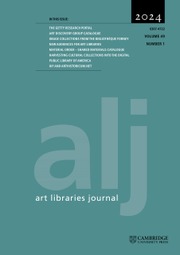No CrossRef data available.
Article contents
The Creswell Library of Islamic Art and Architecture at the American University in Cairo Part One: in the Presence of the Original Owner, 1956-73
Published online by Cambridge University Press: 06 June 2016
Abstract
In 1956 the American University in Cairo (AUC) committed itself to the formidable task of transforming a purchased personal library into a specialized university library supporting research and teaching in a new curriculum in Islamic art and architecture. The library’s original owner, K. A. C. Creswell, the eminent British historian of Islamic architecture, became at age 77 the university’s first professor in the discipline. An agreement that he would have exclusive use of the library during a three-year teaching period set the pattern for later years. Until 1973, while Creswell remained in Cairo, the uncatalogued library, though used by Islamic art faculty and their thesis-writing students, was barely accessible to other Islamic art students and faculty in related fields. Secrecy surrounding the library’s purchase hindered the university’s dealings with Creswell. When the Suez War interrupted final arrangements, Creswell’s exemption from the government-ordered expulsion of British nationals, and permission to move the books to the university, were secured by telling the government of Egypt that the library was Creswell’s gift to AUC.
- Type
- Research Article
- Information
- Copyright
- Copyright © The Art Libraries Society 1992


